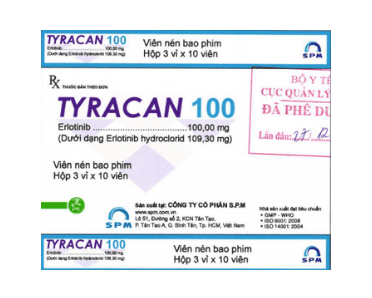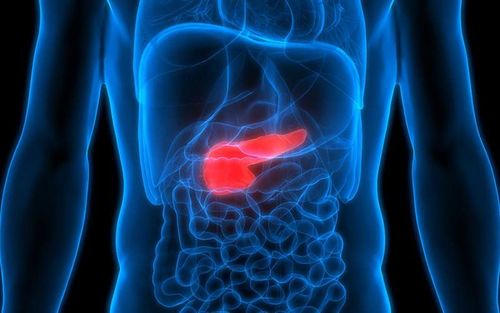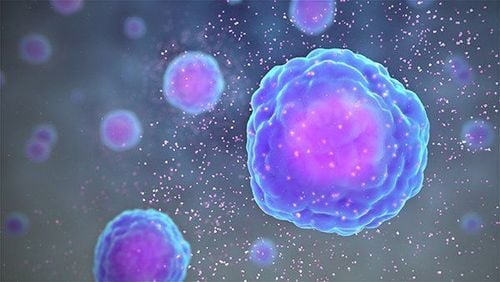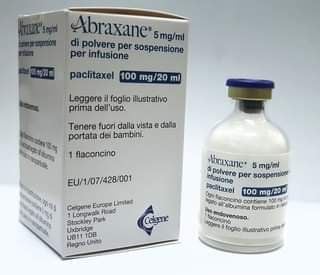This is an automatically translated article.
The risk of pancreatic cancer is about 1% chance of developing the disease. Hereditary pancreatic cancer is less common. They usually occur when a gene mutation or change is passed on from one generation to the next in a family. In addition, there are a number of risk factors that increase the likelihood of this disease such as: smoking, age, medical history....1. Pancreatic cancer
Pancreatic cancer occurs when tumors form in the pancreas, the organ behind the stomach that is responsible for digestion. It is more common in men than in women and usually occurs after age 45. Pancreatic cancer tends to spread silently before it is diagnosed. It is precisely this that makes it one of the deadliest cancer diagnoses.Pancreatic cancer occurs when the DNA in a cell in the pancreas is damaged. A single cancer cell grows and divides rapidly, becoming a tumor. Without treatment, cells from the tumor will spread through the blood or lymphatic system.
There is no exact data as to how cellular DNA is damaged. It is only when doctors remove pancreatic cancers and analyze them that they often find certain changes in genes called mutations. This mutation will vary from person to person with each episode of the disease.
Types of pancreatic cancer:
Cancer of the exocrine pancreas (the part that makes digestive substances). Although there are several different types of exocrine pancreatic cancer. Approximately 95% of cases of pancreatic cancer are malignant. Because the exocrine pancreas makes up 95% of the pancreas, pancreatic cancers are more likely to arise here. In addition, some less common exocrine pancreatic cancers include: adenocarcinoma, squamous cell carcinoma, large cell carcinoma, acinar cell carcinoma, and epithelial cell carcinoma. small tissue. Endocrine pancreatic cancer (the part that makes insulin and other hormones). This is an uncommon cancer and is named after the hormone, such as: Insulinomas (from an insulin-producing cell), Glucagonomas (from a glucagon-producing cell), Somatostatinomas (from a glucagon-producing cell), somatostatin production)...

2. Pancreatic cancer risk factors
2.1. Modifiable risk factors Smoking This is one of the important risk factors for pancreatic cancer. The risk of pancreatic cancer in smokers is twice as likely as in those who have never smoked.Approximately 25% of pancreatic cancers are attributed to smoking. Smoking cigars and using smokeless tobacco products also increase the risk of the disease. However, the risk of pancreatic cancer begins to decrease after smokers stop smoking.
Overweight Overweight-obesity is a risk factor for pancreatic cancer. Obese people have an approximately 20% higher risk of developing pancreatic cancer. Moreover, when the waist is fat and there is an increase in mass, it also increases the risk of disease while the person is not too fat.
Diabetes Pancreatic cancer is common in people with diabetes. To date, there is no evidence to support this association. However, most of the risk is found in people with type 2 diabetes. This diabetes is also on the rise in children and adolescents as obesity in these age groups is also increasing. Type 2 diabetes in adults is also commonly associated with being overweight or obese. But for people with type 1 diabetes, the link is not clear.
Chronic pancreatitis Chronic pancreatitis is associated with an increased risk of pancreatic cancer. Chronic pancreatitis is commonly found in heavy alcohol users and smokers.
Direct contact with chemicals Chemical exposure when working or living in an environment that is directly exposed to chemicals such as chemicals used in the dry cleaning industry, metal processing. This is an increased risk factor for pancreatic cancer.
Trắc nghiệm: Bạn biết gì về các yếu tố nguy cơ, chẩn đoán và điều trị ung thư tuyến tụy?
Ung thư tuyến tụy phổ biến thứ 10 trong những bệnh ung thư mới và là nguyên nhân thứ 4 gây tử vong do ung thư ở nam, nữ. Bài trắc nghiệm này sẽ kiểm tra kiến thức của bạn về các yếu tố nguy cơ, chẩn đoán và cách điều trị ung thư tuyến tụy.
Bài viết tham khảo nguồn: medicalnewstoday 2019
Gender Men are more likely to develop pancreatic cancer than women. This could be due to a number of reasons such as the higher prevalence of tobacco use in men than in women. It is one of the risk factors that increase the risk of pancreatic cancer.
Race African Americans are more likely to develop pancreatic cancer than Caucasians. The reasons for this are clear, but may be partly due to higher rates of some other risk factors for pancreatic cancer, such as diabetes, smoking and being overweight.
History of pancreatic cancer seems to be related to a history of the disease. In some of these families, the high risk of developing the disease is due to an inherited syndrome. In other families, however, the gene that causes the risk of developing the disease is not known. Although family history is a risk factor, most people with pancreatic cancer do not have a family history.
Hereditary syndrome. Inherited gene changes (gene mutations) can be passed from parent to child. These gene changes can cause up to 10% of pancreatic cancers. Sometimes these changes lead to syndromes including an increased risk of other cancers (or other health problems). Examples of inherited syndromes that can cause pancreatic cancer include:
Hereditary ovarian and breast cancer syndromes, caused by mutations in the BRCA1 or BRCA2 genes; Hereditary breast cancer caused by mutations in the PALB2 gene Groove atypical melanoma syndrome (FAMMM), caused by mutations in the p16/CDKN2A gene and associated with eye and skin melanoma Trench pancreatitis, usually due to mutations in the PRSS1 gene Lynch syndrome, Also known as hereditary non-rectal cancer (HNPCC), it is usually caused by a defect in the MLH1 gene or MSH2 Peutz-Jeghers syndrome, which is caused by defects in the STK11 gene. This syndrome is also associated with polyps in the digestive tract and some other cancers. The changes in the genes that cause some of these syndromes can be found with genetic testing.
Chronic pancreatitis (due to genetic changes) Chronic pancreatitis is sometimes caused by inherited genetic mutations. People with this hereditary pancreatitis have an increased risk of developing pancreatic cancer.

Physical inactivity Some studies show that lack of physical activity can increase the risk of pancreatic cancer. But not all studies have found this.
Coffee Some previous studies have suggested that drinking coffee may increase the risk of pancreatic cancer, but recent studies have not confirmed this.
Alcohol Several studies have shown an association between heavy alcohol use and pancreatic cancer. This link is uncertain, but heavy alcohol use can lead to conditions such as chronic pancreatitis, which is known to increase the risk of pancreatic cancer.
Infection Some studies have shown that stomach infection with the ulcer-causing bacteria Helicobacter pylori (H. pylori) may increase the risk of pancreatic cancer. Or hepatitis B infection carries a similar risk. Previous studies have also suggested that hepatitis B infection is twice as common in people with pancreatic cancer. However, more research is still needed to find out more about this association.

3. Cancer Screening
Early cancer screening is considered the perfect measure in timely detection and treatment of cancers. Reduce the cost of treatment and especially reduce the mortality rate in patients. Vinmec International General Hospital always deploys and introduces to customers a HIGH-TECH CANCER CHECKLIST PACKAGE to help with gene testing, imaging, and biomarkers for early tumor detection. Vinmec International General Hospital has many early cancer screening packages. Only one gene test can assess the risk of 16 common cancers in both men and women (lung cancer, colon cancer). rectal cancer , breast cancer , pancreatic cancer , cervical cancer , stomach cancer , prostate cancer ,....)Early detection of early signs of cancer through diagnosis imaging, endoscopy and ultrasound. The operation is simple, careful and accurate. A team of well-trained specialists, especially in oncology, are capable of handling cancer cases. With facilities, advanced and modern medical equipment and a team of doctors with deep expertise and experience. At Vinmec, the examination process becomes fast with accurate results, saving costs and time for patients.
To register for examination and treatment at Vinmec International General Hospital, you can contact Vinmec Health System nationwide, or register online HERE.
Reference sources: cancer.net, cancer.org, webmd.com
See more:
Current methods of treatment & prevention of pancreatic cancer Diet for pancreatic cancer patients Advanced endoscopic surgery clears the clouds, lights up hope for poor patients with pancreatic cancer













